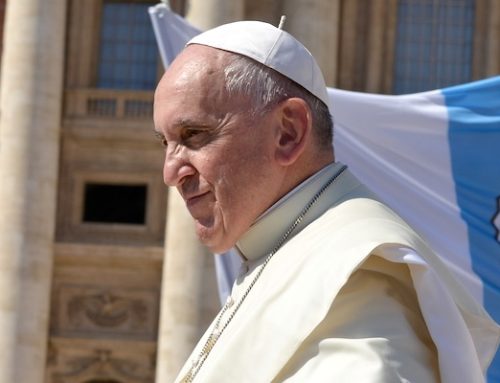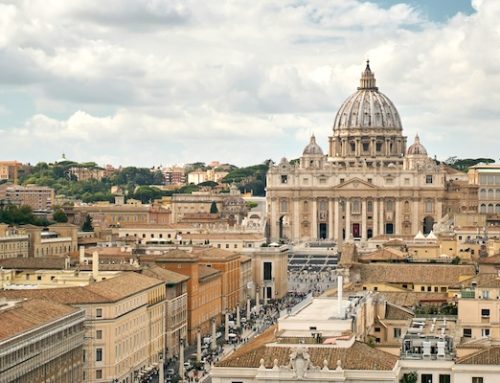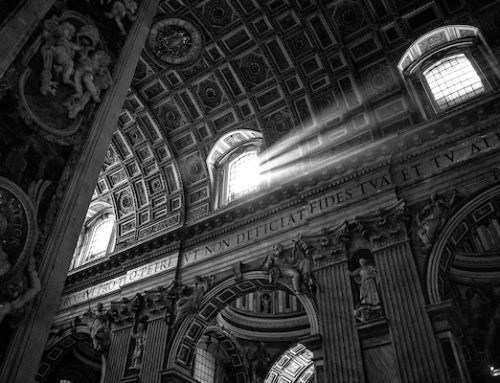“The diaconal service of charity must include imitation of Christ by means of unconditional self-giving.”
Today is the Feast of St. Lawrence, the deacon martyr who was famously cooked to death. The great Amy Welborn has a post about him with some insight from the Vatican website, from theologian Father Francesco Moraglia. He discusses St. Ambrose’s “eloquent account of the martyrdom of St. Lawrence” — and what that means to us deacons today:
Ambrose dwells, firstly, on the encounter and dialogue of Lawrence and Sixtus. He alludes to the distribution of the Church’s goods to the poor and ends by mentioning the grid-iron, the instrument of Lawrence’s torture, and remarks on the phrase which the proto-Deacon of the Roman Church addresses to his torturers: “assum est…versa et manduca” (cf. Bibliotheca Sanctorum …., col 1538-1539).
Thus writes St Ambrose:
“St Lawrence wept when he saw his Bishop, Sixtus, led out to his martyrdom. He wept not because he was being let out to die but because he would survive Sixtus. He cried out to him in a loud voice: ‘Where are you going Father, without your son? Where do you hasten to, holy Bishop, without your Deacon? You cannot offer sacrifice without a minister. Father, are you displeased with something in me? Do you think me unworthy? Show us a sign that you have found a worthy minister. Do you not wish that he to whom you gave the Lord’s blood and with whom you have shared the sacred mysteries should spill his own blood with you? Beware that in your praise your own judgment should not falter. Despise the pupil and shame the Master. Do not forget that great and famous men are victorious more in the deeds of their disciples than in their own. Abraham made sacrifice of his own son, Peter instead sent Stephen. Father, show us your own strength in your sons; sacrifice him whom you have raised, to attain eternal reward in that glorious company, secure in your judgment”.
In reply Sixtus says: “I will not leave you, I will not abandon you my son. More difficult trials are kept for you. A shorter race is set for us who are older. For you who are young a more glorious triumph over tyranny is reserved. Soon, you will see, cry no more, after three days you will follow me. It is fitting that such an interval should be set between Bishop and Levite. It would not have been fitting for you to die under the guidance of a martyr, as though you needed help from him. Why do want to share in my martyrdom? I leave its entire inheritance to you. Why do need me present? The weak pupil precedes the master, the strong, who have no further need of instruction, follow and conquer without him. Thus Elijah left Elisha. I entrust the success of my strength to you”.
This was the contest between them which was worthy of a Bishop and of a Deacon: who would be the first to die for Christ (It is said that in tragedy, the spectators would burst into applause when Pilade said he was Orestes and when Orestes himself declared that he was Orestes) the one who would be killed instead of Orestes, and when Orestes prevented Pilades from being killed in place of himself. Neither of these deserved to live for both were guilty of patricide. One because he had killed his father, the other because he had been an accomplice in patricide.) In the case of Lawrence, nothing urged him to offer himself as a victim but the desire to be a holocaust for Christ. Three days after the death of Sixtus, while the terror raged, Lawrence would be burned on the grid-iron: “This side is done, turn and eat”. With such strength of soul he conquered the flames of the fire” (Ambrose, De Officiis).
The principle characteristic defining the Deacon in se, and his ministry, is that he is ordained for the service of charity. Martyrdom, which is a witness to the point of shedding one’s blood, must be considered an expression of greater love or charity. It is service to a charity that knows no limits. The ministry of charity in which the Deacon is deputed by ordination is not limited to service at table, or indeed to what former catechetical terminology called corporal works of mercy, nor to the spiritual works of mercy. The diaconal service of charity must include imitation of Christ by means of unconditional self-giving since he is the fruitful witness …… (cf Ap 1, 5:13; 14).
In the case of Lawrence, as St Ambrose explains, “no other desire urged him but that of offering himself to the Lord as a holocaust” (de Officiis, 1,41, n. 207). By means of the witness borne before his persecutors, it is evident that the diaconal ministry is not to be equated with that of service to one’s neighbor, understood or reduced solely to their material needs. Lawrence, in that act which expresses a greater love for Christ and which leads to his giving up his own life, also permits his tormentors, in a certain sense, to experience the Incarnate Word who, in the end, is the personal and common destiny of all mankind. This is a theological service of charity to which every Deacon must tend or, at least, be disposed to accept.
Read it all. There is much wisdom and insight here! (A grateful diaconal bow to Amy, who never fails to amaze me. If you haven’t bookmarked her blog, do it!)
Image: St. Lawrence, 5th-century mosaic from the mausoleum of Galla Placidia in Ravenna / by Lawrence, OP / Flickr / Creative Commons license






